Search
Showing 10 of 524 results for group registration
-
Education delegation to Asia
One of the real highlights of the trip for the Minister was meeting New Zealand alumni, compelling ambassadors for a New Zealand education. Vikra Ijas is a former University of Auckland student and co-founder of Kitabisa, a crowd-funding platform in Indonesia. His story of schooling and tertiary study in New Zealand leading to the establishment of his fundraising platform for social good in Indonesia was truly inspiring.
South Korea
The programme in South Korea included the Minister’s speech to the Korean International Education and Career Fair. This is the largest international education fair in South Korea, with an estimated 25,000 attendees. More than 40 New Zealand providers were present, many exhibiting on the Education New Zealand country pavilion.
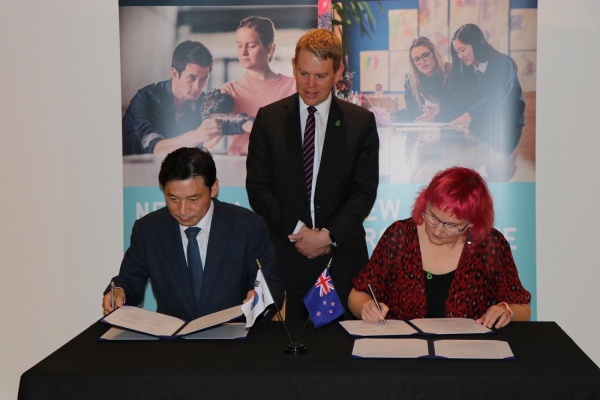
The Minister also witnessed the signing of the Education New Zealand-Incheon Education Cooperation Arrangement (ECA). The formal partnership, based on the ECA, has been designed to establish and strengthen communication ties between ENZ and the Incheon East Asia Global Education Institute, to identify creative areas of potential collaboration and to open up more learning possibilities for our institutions and students.
Minister Hipkins also attended an event with New Zealand education agents, alumni and institutions to celebrate the 60th diplomatic anniversary between South Korea and New Zealand.
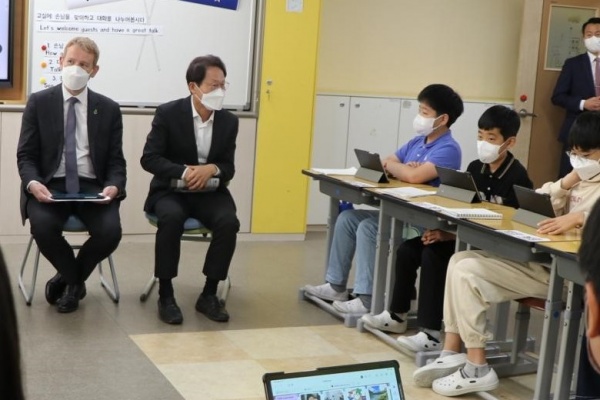
One of the highlights of the Minister’s visit to South Korea was on 24 October 2022, when the education delegation visited Kyodong Elementary School, the oldest school in South Korea (established in 1894). The delegation toured the school and interacted with the students who are participating with Raumati Beach School in the New Zealand - Korea digital cultural exchange programme supported by Education New Zealand and facilitated by Learn English Live.
Indonesia
The programme in Indonesia included bilateral meetings with the Secretary General of the Ministry of Education and Culture, the Coordinating Minister for Human Development and Culture, the Minister for National Development Planning and the ASEAN Secretary-General. The Minister also met with the President Director of Lembaga Pengelola Dana Pendidikan (LPDP), the key Indonesian government scholarship agency, to discuss opportunities to promote New Zealand as a destination for the awardees while further expanding the number of New Zealand institutions eligible to receive the scholarship students.
As well as the visit to Kitabisa, the Minister also had the opportunity to meet a group of Kiwi students interning at WIR Group (Metaverse) in Jakarta under the Prime Ministers Scholarship for Asia. The students were thriving on the unique opportunity and wringing every bit of experience from their internship at WIR. He also launched KIWI Challenge 2022, the annual entrepreneurship competition for Indonesian high school students organised by Education New Zealand.
As with South Korea there was a reception in Jakarta with agents, alumni, PMSA students and key stakeholders.
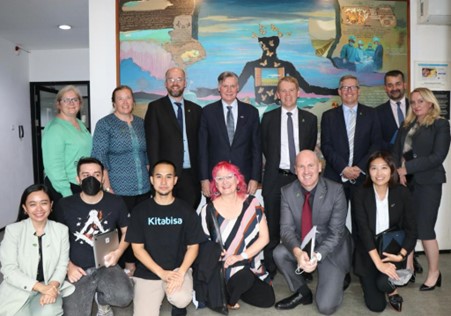
Singapore Visit
The focus of the Singapore leg of the visit was signing the refreshed Education Cooperation Arrangement with the Minister of Education from Singapore. The arrangement, first signed in 2018, confirms New Zealand’s commitment to engaging with Singapore on education cooperation initiatives in key policy areas including early childhood education, digital classrooms/blended learning, vocational and lifelong learning, sports and physical education, STEM uptake, and the development of mental health support programmes for the sector.
The Minister also made several institutional visits. The first was to the Institute of Technical Education Central College to understand where Institutes of Technical Education fit within Singapore’s education ecosystem; and the second was the Public Service Sector and Civil Service College. The purpose of this visit was to understand the role that the Civil Service plays in designing, developing and delivering programmes for the Public Service.
The final visit of the trip was to the Centre for Strategic Focus. The Centre is part of the Strategy Group in the Prime Minister’s Office which was set up to focus on whole of government strategic planning and prioritisation.
“The messages around the strong commitment of the New Zealand government to international education were very well received by our partners,” says ENZ Regional Director Ben Burrowes. “Whether via student mobility, international education partnerships or systems level dialogue, it’s exciting to see the interest generated through New Zealand stepping up its international engagement once again.”
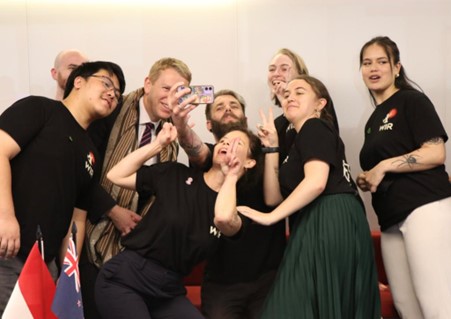
-
Join us for the Latin America Study with New Zealand Virtual Fair
“The fair will be a great opportunity for providers to connect with prospective students in the Latin American market, using an interactive digital platform,” says Javiera Visedo, Director of Engagement Latin America for Education New Zealand Manapou ki te Ao (ENZ).
“ENZ is seeking expressions of interest in the fair, which we are hosting in collaboration with FPP. If you are interested in participating, please fill out the Expression of Interest form by 9 December 2022.”
Invitations to register will follow in the new year.
Find out more about Latin America
Key areas of focus for ENZ in Latin America include Brazil, Colombia and Chile, and we have staff based in São Paulo and Santiago.
Close to 6,000 international students came to New Zealand from Latin America in 2019, and Brazil is our eighth largest market. Since the pandemic there has been intense activity from our competitors with many of them establishing in-country representatives, which demonstrates the importance of this region in international student recruitment.
Beyond student recruitment, ENZ also values the government and education connections with the region.
ENZ recently hosted a series of Latin America Masterclasses, which saw participants from around Latin America tuning in to watch live lectures delivered by New Zealand academics.
In June this year, Education Minister Chris Hipkins created great buzz with his visit to Brazil and Chile, part of his first international trip since the beginning of the pandemic.
Group recipients of the Prime Ministers’ Scholarships for Latin America have recently started making their way to Brazil, Colombia and Chile to participate in short study exchanges. These include several Māori led groups, supporting connections with indigenous nations in the region.
In September, ENZ attended the FPP Virtual Fair in Colombia. The fair had more than 800 visitors, with over 100 visiting the ENZ booth. There was strong interest in tertiary programmes and language studies. The virtual fair was a great opportunity to promote New Zealand as a study destination within the Latin American market.
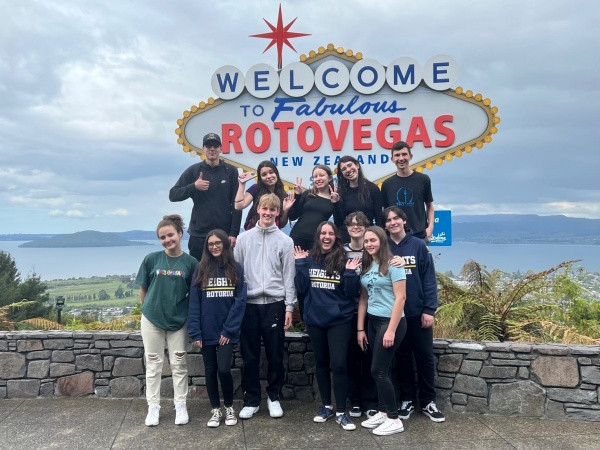
A group of 100 high school students from Paraná State in southern Brazil had a three-month study experience this year with schools in Auckland, Rotorua, Hawkes Bay, Palmerston North, Wellington, Canterbury and Invercargill.
Brazil
In 2019, there were 3,324 Brazilian students studying in New Zealand. Being from non-English speaking countries, the majority of Latin American students will start their education experience in New Zealand studying English. Scholarships offered by the local state governments have also contributed to the presence of Brazilian students in New Zealand and in 2022, 100 students from the state of Parana in Brazil travelled to New Zealand on a 3-month exchange. The students were placed at high schools across the country and gave positive feedback about their time here.
Colombia
Colombia is New Zealand’s second largest market in Latin America, second only to Brazil. In 2019, there were 1,360 Colombian students studying in New Zealand.
In 2023, 22 students from Bogotá, Colombia, will travel to New Zealand to study during terms one and two. Most of the students will be based at schools across the North Island, with one group heading down to Nelson.
On 23 November 2022, ENZ launched the I AM NEW campaign in Spanish at an event in Bogotá, to promote a New Zealand education.
Chile
The recent CAPE LatAm ‘Celebrating 50 years of diplomatic relations with Chile’ event, hosted at Parliament, was a great example of the rich history of connections between New Zealand and Chile.
Chile is New Zealand’s third largest market in Latin America. In 2019, there were 1,193 Chilean students studying in New Zealand. The majority of Chilean students come to New Zealand to study English Language, but enrolment in schools has also been consistent, with 17% of students studying at New Zealand schools in 2019.
Flights
Latam will be resuming their daily flights to Sydney via Auckland from mid-December and Qantas is flying three times per week from Santiago direct to Sydney. Although the cost of flights is high, in line with worldwide trends, the resumption of regular flights demonstrates the high demand for the Latin America to Oceania route.
Expressions of interest in the Latin America Study with New Zealand Virtual Fair are due by 9 December 2022. You can access the online form here.
If you have any questions about the event, please contact latinamerica@enz.govt.nz
-
First marae-led Prime Minister’s Scholarships for Asia recipients build indigenous connections in Japan
The first marae-led Prime Minister’s Scholarships for Asia recipients (members of Te Piruru Papakainga, Ngāti Maniapoto) visited Japan for a six-week visit that included a customised internship that connected them with indigenous Ainu organisations and villages in Hokkaido.
ENZ’s Manukura Chief Advisor Māori, Ed Tuari and Director of Education – Japan, Misa Kitaoka, welcomed the scholarship recipients in Tokyo in early January.
This is a great outcome for the Prime Minister’s Scholarship Programme, which has seen an increase in Māori participation. The latest round of applications for the scholarships saw an increase in Māori participation to 22 percent in 2022 from 5 percent from 2016 to 2019.
ENZ is eager to continue partnering with iwi, marae and whānau groups to raise Māori participation in the Prime Minister’s Scholarship programme, particularly in the current group round that opened for applications in March.
ENZ’s Manukura Chief Advisor Māori, Ed Tuari said it was a privilege to participate in what is an important milestone for building indigenous connections between Māori and the Ainu people of Japan.
“This is a significant achievement for ENZ Manapou ki te Ao. I want to acknowledge this collective achievement as we break new ground with this marae-led group of PMSA recipients.
“It’s hugely encouraging to see the increase of Māori participation in the latest round of the scholarships. This is a demonstration of ENZ ‘walking the talk’ to ensure Māori are better represented in opportunities to share and learn on the global stage, as well as promote indigenous to indigenous exchanges.”
ENZ’s Director Scholarships Carla Rey Vasquez said she was excited to see the growth and learnings that these programmes would bring to the wider whānau and iwi.
“Our scholarship recipients cherished the opportunity to connect with indigenous communities in Japan, and they particularly appreciated the value of reciprocity as well as the importance of generational knowledge being shared along.
“We look forward to continuing to raise Māori participation in the Prime Minister’s Scholarship programme.”
The latest visit by scholarship recipients has also been a good opportunity to enrich the existing education connections between New Zealand and Japan under a Memorandum of Understanding between New Zealand and the Hokkaido Government, which was renewed in 2022.
The customised internship that saw scholarship recipients visit Ainu villages and organisations, was organised by the Hokkaido Government and the Hokkaido Board of Education.
ENZ’s Director of Education – Japan, Misa Kitaoka, said the visit by scholarship recipients was timely as Japan starts to promote Ainu history, language and culture.
“The Ainu people received official recognition as ‘indigenous people of northern Japan’ from the Japanese government in 2019. As the government begins to promote Ainu history, language, and culture in Japan, Ngāti Maniapoto’s visit to Hokkaido was timely and appreciated by the Ainu community to learn about how New Zealand society has embraced Māori language and culture.”
Applications are open for the 2023 group round of the Prime Minister’s Scholarships for Asia and Latin America until 23 April 2023. More information on applications is available on ENZ's dedicated scholarship website here.
[updated 18 April 2023]
-
Student welcomes continue throughout the country
Timaru
In the Timaru District, a total of 83 students from America, China, Japan, Germany, South Korea, Hong Kong and Laos were officially welcomed by the Mayor at a function at the Caroline Bay Hall on March 20. It was the first time a mayoral welcome of students has been held in Timaru since Feb 2020.
The welcome featured performances from the Roncalli College kapa haka group and Mountainview high School’s jazz band. Guest speakers included district Mayor, Nigel Bowen and MP for Rangitata Jo Luxton.
Whanganui
Earlier this month 27 students from Japan, India, Germany, China, Thailand, and Scotland were treated to a rousing (and musical) welcome from the Cullinane College kapa haka group at the Cooks Gardens event centre in Whanganui.
Whanganui Deputy Mayor Helen Craig welcomed the students to “New Zealand’s only UNESCO City of Design” highlighting the importance of cultural interaction between international students and their New Zealand counterparts.
Cullinane College kapa haka group welcoming Whanganui’s international students. Click on the image to view the video. -
Hands-on agribusiness experience for NZ students in Brazil, Chile and Colombia
Despite being located on opposite sides of the world, New Zealand and Latin America have very similar climates, a phenomenon which serves as an opportunity for students in professions connected to agriculture to broaden their knowledge and practical skills. The Prime Minister’s Scholarship programme has supported students travelling to Brazil, Chile and Colombia to study this subject.
In operation since 2013, the Prime Minister’s Scholarship programme has already provided support for around 3,050 New Zealanders studying abroad, covering their travel, meals, accommodation, studies, technical visits, and journeys in different regions.
In 2022, Brazil was the most popular Latin-American country among group scholarship recipients, receiving visits from three groups. Brazil was also the first country to welcome New Zealand students from the program following the COVID-19 pandemic.
12 members of the Agronomy and Business Faculty of Lincoln University travelled to São Paulo in November last year. Over the course of five weeks, they visited and studied at three Brazilian universities, visiting farms and production centres in São Paulo, Minas Gerais, Paraná and Santa Catarina states.
According to Dr. Hugh Bigsby of Lincoln University, who coordinated the groups of students, their visits were organised so they could learn about the countries and their cultures through their food.
“Our programmes are called ‘agribusiness summer schools’ and the aim is to try to understand the local economy, over a period of five weeks, through processes involved in food production and the textile industry, for example,” Hugh said.
“In each country, we introduce the students to farms, sales chains and supermarkets. At the end of the program, they are required to present a business idea that can contribute to the commercial relations between New Zealand and each country visited, supporting exports and imports,” explained Hugh.
Amongst the places visited in Brazil were the Higher Education School of Agriculture of the University of São Paulo, in Piracicaba; the Faculty of Agrarian Sciences of the Federal University of Paraná, in Curitiba; and the experimental farms operated by the Federal University of Viçosa.
“The partnerships with the local universities of each country are fundamental to the success of our program, since each of them provides us with the local economic context, demonstrates technological advances that are underway, and explains the specific features of the local producers,” Hugh said.
At the same time, a group of 10 students, from the School of Agriculture and Development at Massey University, were in Chile to pursue their studies of agribusiness techniques. The students explored several regions across the country, visiting the Austral University of Chile, the Catholic University of Valparaiso, and Magallanes University in Punta Arenas.
In addition to the universities, the students went to the Santiago Botanic Gardens, dairy cattle farms, vineyards, avocado plantations, and food cooperatives.
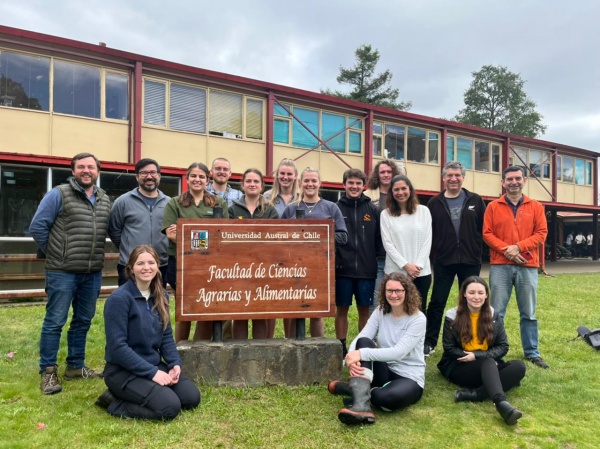
Massey University students at Universidad Austral de Chile, in Chile.
Massey University Professor Ignacio López, accompanied students on their visit. He said the trip was an incredible experience.
“The students were impressed with how the farmers are capable of sustainably farming foods in extremely harsh conditions” Ignacio said.
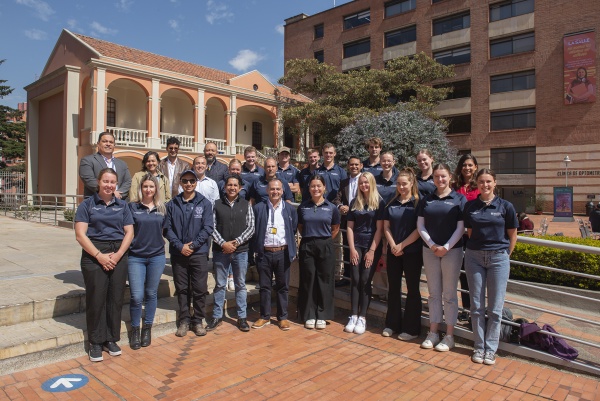
Lincoln University students at Universidad de La Salle, in Colombia.
A group of 20 students from the Agronomy and Business Faculty of Lincoln University travelled to Bogotá, Colombia, in January to study agribusiness. They were in the country for four weeks, studying at the La Salle University, located in the Colombian capital, and at Manizales University.
The students learnt about the wide range of agribusiness activities conducted in the country and in the Mercosur region, including detailed studies of Colombian coffee production techniques, which are considered a benchmark across the world.
The students from the three groups all returned home having recognised the creativity and experience of the Latin-American agricultural producers.
“For our students, the trip opened their minds to new possibilities and different ways of working with agriculture,” said Ignácio Lopez.
“They also realised that what they had experimented with can, indeed, be adjusted and applied in New Zealand” he said.
-
Reflections from English Teachers in South Korea
In January 2024, six New Zealand teachers were selected to spend part of their summer season teaching English in South Korea as part of the New Zealand Korea FTA Partnership English Language Training Programme.
This programme is supported by Education New Zealand Manapou ki te Ao (ENZ) who assists with the teacher recruitment process. This was one of the key KNZFTA programmes recently discussed during the South Korea Government delegation visit to New Zealand late last year.
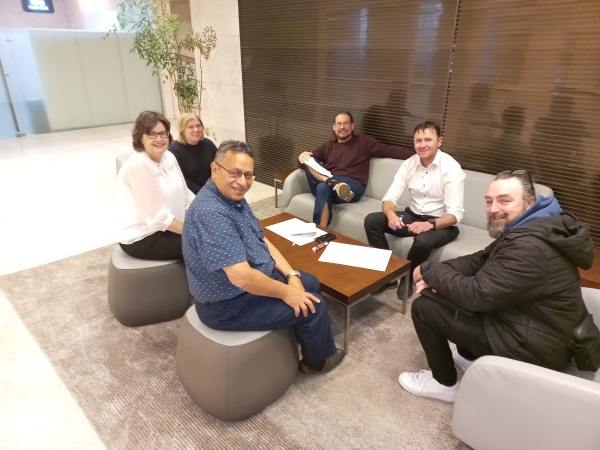
The group of six New Zealand teachers selected to teach English in South Korea in January. From left, Jane Bassett, Food Technology Teacher from Havelock North Intermediate School, Sharon Powell, English Teacher from Long Bay College in Auckland, Kara Shortland, Acting Team Leader (Bilingual) from Whangārei Intermediate School Te Tai Tokerau. Glenn Cheyne, Head of Learning Area Social Sciences from Nayland College in Nelson, Gordon Sim, Social Science teacher from Hillcrest High School in Hamilton, and Dan Greer, Social Studies/Drama teacher from Logan Park High School in Dunedin.
Kay Lee, ENZ Senior Market Development Manager – Korea, said that it was an absolute pleasure to see New Zealand teachers continue to travel to South Korea to teach English during their summer break.
“There are so many positive outcomes from the running of this cross-cultural programme for both the Korean students and the New Zealand teachers participating.
"On one hand, the students get the opportunity to hone their English language skills while experiencing the New Zealand teaching style, learning more about New Zealand, including its culture and education system. Meanwhile, while teaching English and serving as ambassadors of a New Zealand education, the teachers can immerse themselves in Korean life for a few weeks, seeing new sights, trying new food and making new friends.
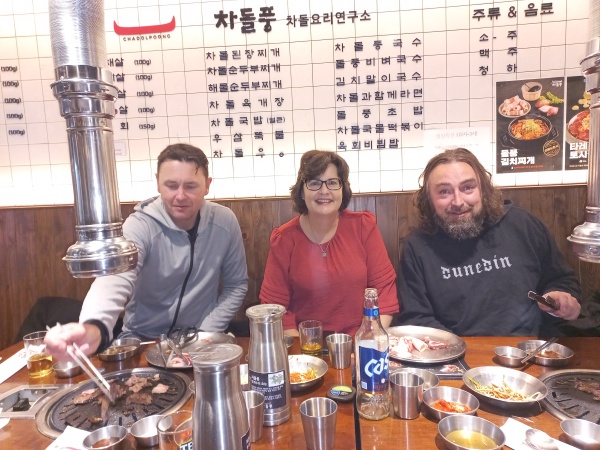
Gordon, Jane, and Dan, sampling Korean cuisine at the end of the teaching day.
"Our Korean government partner for educational programmes, EPIS, has acknowledged ENZ for its significant contribution to the programme’s success through effective teacher recruitment. These positive outcomes are testament to the strength of our NZ-Korea Government-to-Government partnership,” added Kay.
Upon their return to New Zealand, two of the teachers who are trained in teaching English as a Second Language (ESL), shared their experiences with ENZ. Read on to hear about the reflections from their two weeks abroad....
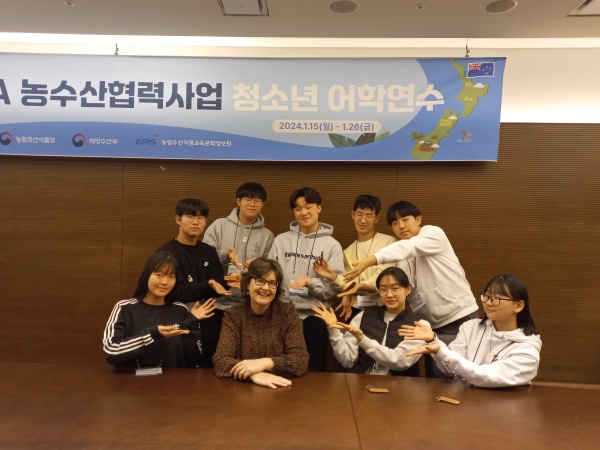
Jane Bassett (지안 (Jian) from Havelock North Intermediate School with her students.
Jane Bassett is a Food Technology teacher at Havelock North Intermediate School and said that the experience of exchanging cultures whilst teaching in an overseas classroom environment was an absolute privilege.
“Our students were aged 14 – 17 years old and came from all over South Korea with family backgrounds in the Agricultural and Fisheries industries. Each student had been awarded a scholarship from the Korean government to attend the two-week intensive English programme organised by the Hyundai Research Institute.
"The Institute went above and beyond in their efforts to ensure an incredible experience for both the students and our group of teachers.
“The teaching programme included a wide range of modules and as well as English grammar, we covered lessons on New Zealand culture, history, tourism, agriculture, sports, famous New Zealanders, and school life. My class was also exposed to the New Zealand Technology curriculum and was tasked with developing a new snack product. As part of the project, I introduced them to several New Zealand snacks and Kiwi classics such as WeetBix, Marmite and Watties Baked Beans, to varying degrees of enjoyment!”
Students were encouraged to speak in English throughout the day via fun-games, readings, conversations and plays so that the teachers could fine-tune their English to help them become more fluent with more natural English phrasing.
"We also explained aspects of Māori culture and the significance of pepeha (way of introduction). The students, who were from agricultural and fisheries backgrounds, were quickly able to identify their own awa (river) and maunga (mountain), showing their own personal connection to their land.”
Jane said that a personal highlight was being able to spend her birthday in Seoul learning about Korean cuisine through a cooking class on kimchi making and tea ceremony in a traditional house. She admitted that this was an appropriate birthday experience for a New Zealand Food Technology teacher!
She summed up the experience by saying that the group of teachers gained a greater understanding of cultural diversity and appreciation of the challenges learning English poses for new learners, learnings which they will take home with them.
“We really hope that our students will remember their experience as fondly as we will and that they will look to study and visit New Zealand in the future.”
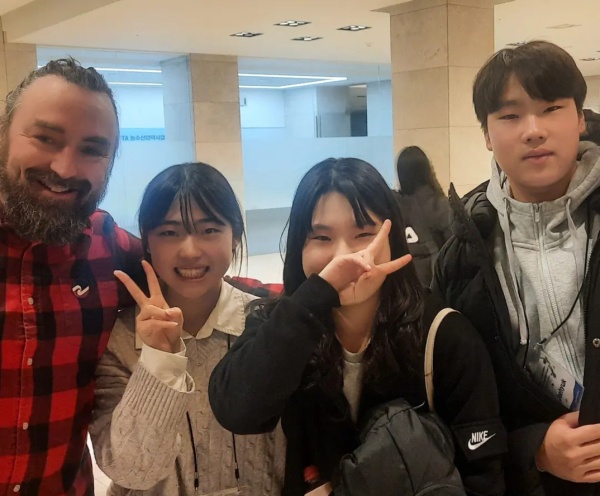
Drama and Social Studies teacher, Dan Greer, of Logan Park High School with three of his students.
Dan Greer, is a drama and social studies secondary school teacher from Logan Park School in Dunedin. He joined Jane as one of the six teachers selected to travel to South Korea, his second experience as an English language teacher in South Korea, having taught in Ulsan 12 years ago.
“I had such an amazing time participating in the Hyundai Research Institute’s programme. It was great to have other quality teachers on this experience with me and we were able to work together, mixing up the style of teaching and activities. I had the more beginner level class, and as a drama teacher we added games to my traditional English teaching. The students really enjoyed it, and it gave them more confidence to give things a go”.
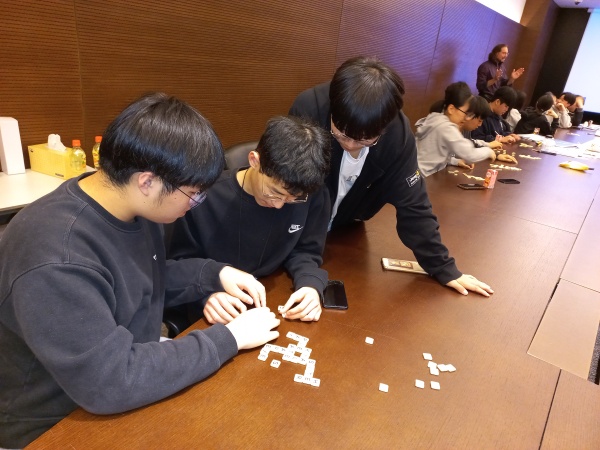
Dan reflected on the fact that there was one practice of teaching English in Korea that he had often thought was a little unfair, that being the naming of Korean students with English names.
“As an English teacher in Korea, you are often asked to name Korean students with English names. Sometimes this is because they want them, sometimes it is because they ’have’ to, and for many it is because westerners find Korean names hard to pronounce. I have named nine children in my life, one being my daughter and the other eight have been my Korean students”.
Dan used this practice as a topic of discussion in class one day and shared his opinion that it had not always felt right to him as he felt that if Korean students were taking the time to learn the English language, that teachers should make an effort in return.
He then asked his students whether English teachers should have Korean names. This prompted them to ask many questions about Dan including who he is when he is not “Dan the teacher”, his whakapapa, and the meaning of his name in English.
Dan said “You can imagine my surprise when my students were all waiting for me when I arrived the next day. One wonderful student then stood up and using perfect English gifted me a Korean name. I was no longer just “Dan the Teacher,” but also now 도혁 (Dohyuk), which meant I was ‘leading them to a bright path’.
“This was such a humbling experience that I will cherish forever. For me, this is what makes teaching and life so special,” added 도혁 (Dan).
If the Korean organisers decide to run the NZ-Korea FTA Partnership English Language Training Programme in the future, ENZ will continue to share the applications with NZ school teachers through the Asia NZ Foundation and Schools International Education Business Association (SIEBA).
-
Noteworthy education programme featured during Prime Minister’s Trade Mission to Japan
Hot on the heels of the Prime Minister’s Trade Mission to Southeast Asia in April, relationships with our partner countries in the region continued to be strengthened for the benefit of the education sector during New Zealand’s most recent trade mission to Japan. This mission supported export sectors, including education, to engage with the Japan market and leverage emerging opportunities while advancing the New Zealand brand. The inclusion of education in the high-level visit acknowledges its contribution to the government’s ambition to lift the value of exports.
The strong people-to-people links between New Zealand and Japan are noteworthy with high student mobility in both directions. Japan is the third largest source of international students for New Zealand according to 2023 international student enrolment data with the school sector making up the largest proportion of enrolments. Japan is also a top destination for New Zealand scholars with many joining the Japan Exchange and Teaching (JET) programme and in the most recent Prime Minister’s Scholarship for Asia group announcement, three groups were awarded scholarships for programmes in Japan.
The international education sector was represented by two delegates nominated by ENZ to participate in the full business delegation. Cheryl de la Rey, Vice-Chancellor University of Canterbury, attended as Chair of the Vice-Chancellor’s Committee on behalf of the wider university sector and John van der Zwan, Executive Director, Schools International Education Business Association (SIEBA). Unfortunately, John had to withdraw due to illness.
The education programme elements woven into the high-level visit included a Memorandum of Understanding (MoU) signing, a visit by Mrs Amanda Luxon to a local Japanese school, and scholarship students participating in the New Zealand Sports and Business Leadership luncheon.
MoU between Massey University and a group of all-girls secondary schools
The Prime Minister promoted awareness of New Zealand’s world-leading universities among high schools in Japan through witnessing the signing of an MoU between Massey University and six all-girls secondary schools in Japan.
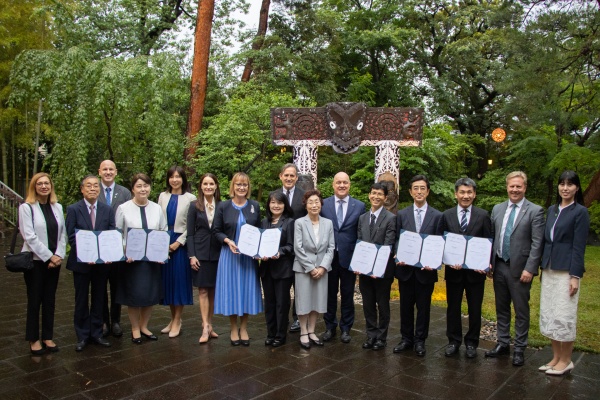
Prime Minister Christopher Luxon witnessed the signing of the MoU between Massey University and six all-girls secondary schools in Japan.
The memorandum signing ceremony was held at the New Zealand Embassy in Japan on 18 June. The MoU will develop a special admission system, enabling Massey University’s foundation or bachelor’s programmes to accept outstanding students recommended by the principals of the Japanese high schools. Through this agreement, students who meet Massey University's English and academic requirements and receive a recommendation from their schools will be able to enrol in Massey University's bachelor's programmes. Students can graduate with a degree in three years from the time they start their studies.
Shelly Turner, Deputy Vice Chancellor represented Massey University in Tokyo at the MoU signing and said at the signing “Te Kunenga ki Pūrehuroa Massey University has a long-standing relationship with Japan, reflecting our commitment to fostering international education and cultural exchange, and more recently we have seen a growing interest in our full degree programmes.
“We are dedicated to providing comprehensive support to ensure our Japanese students thrive academically and personally. We recognise the crucial role of women and girls in tertiary education and are committed to empowering them to achieve their full potential during their studies, and transition to successful careers,” said Shelly.
The Japanese school Principals, including Japan Women’s University Senior High School Principal, Yumi Susuki also welcomed the new partnership.
“For the past 30 years, our school has deepened its understanding of New Zealand culture and society through language training programs in New Zealand. With the 2022 agreement between Education New Zealand and our school, and now the new special admission system with Massey University, we hope to build even richer relationships and empower our students to shape their future,” said Yumi.
The Japanese schools that signed the agreement participated in the 'New Zealand Education Familiarisation Tour,' co-hosted by ENZ and Air New Zealand in March 2024. During the tour, they found a high level of compatibility with Massey’s educational philosophy, wide range of academic options, future-oriented learning environment, and extensive support for international students.
Homei Elementary School
Mrs Luxon with teachers and students at Homei Elementary School.
International education opportunities were also highlighted in a well-received visit Mrs Luxon made to Homei Elementary School on 19 June (affiliated to Japan Women’s University). It was Mrs Luxon's first trip to Japan and her school visit enhanced New Zealand's presence and reputation among all-girls' schools and universities in Japan.
In 2022, an Education Cooperation Arrangement between ENZ and Japan Women's University (JWU) and its affiliated schools including the Homei Elementary School was concluded to promote student and teacher exchange as well as gender equality and women’s empowerment.
From 2025, Homei Elementary School will send its first cohort of six graders (11-12 years old) to St. Margaret’s College for a short-term study and homestay experience.
Sports and Business Leadership Luncheon
The Sports and Business Leadership Luncheon held earlier in the programme on 17 June celebrated people-to-people connections and promoted New Zealand as an attractive study destination, including through the “Tobitate” scholarship programme.
The Tobitate programme, managed by Japan’s Ministry of Education, Culture, Sports, Science and Technology (MEXT), sends students abroad and New Zealand has welcomed many students as part of this initiative. Ten Tobitate Alumni were invited by ENZ to attend the lunch in support of the New Zealand – Japan sporting ties and to promote education opportunities in New Zealand to the Japanese audience.
The Prime Minister’s remarks during the event celebrated ten years of the Game on English programme (which combines rugby and study in New Zealand for Japanese high school students), highlighted Fonterra’s contribution to its success, and announced Air New Zealand as a new sponsor.

Upcoming Events in Japan for NZ education providers
ENZ’s Acting General Manager International and Regional Director Asia (excluding China), Ben Burrowes accompanied the delegation and said he is looking forward to the upcoming ENZ events in Japan.
“The team is preparing to welcome providers to Japan later this year for the New Zealand Fair and Agent Seminars from 6 to 8 October.
“The timing of Prime Minister Christopher Luxon’s recent visit to Japan couldn’t have been better. We will look to further leverage this focus by continuing our work with the sector to promote New Zealand’s education offerings with prospective students, families and education stakeholders in Japan.”
-
New Zealand PTEs elevate profiles with inaugural Philippines Roadshow
The roadshow, the first of its kind to be held in the Philippines, took place from 10 to 16 June, featuring nine PTEs: ACMI New Zealand, academyEX, Auckland Institute of Studies (AIS), Auckland Pilot Training Group, ICA New Zealand, IPU New Zealand, Kalandra Education Group, UP Education, and New Zealand Skills & Education Group. Golden Summit was tasked with delivering the events in Manila, Bacolod, and Cebu.
The roadshow included an agent seminar and agent-led fairs. During the agent seminar in Manila, PTEs presented their offerings to an engaged audience of 37 Filipino education agents, who showed strong interest in the PTE programmes. The roadshow then continued with agent-led fairs in Bacolod and Cebu, drawing 370 and 150 visitors, respectively.

Standing room only at the agent-led fair in Bacalod.
ENZ’s Market Manager, Chor Pramoolpol, led the roadshow and commented that the agent seminar facilitated in-person interactions between PTEs and education agents interested in promoting New Zealand PTEs in the Philippines,
“The agent-led fairs provided prospective Filipino students and their families the opportunity to gather reliable information about studying at New Zealand PTEs by directly communicating with PTE representatives.
“In the recently released full year 2023 enrolment data, the Philippines comes in as the 8th largest partner country for New Zealand and saw a 131% increase in students enrolling with New Zealand education institutions from 2022 enrolments (1,933 vs 835 students). 51% of these total enrolments were for the PTE subsector which shows just how popular they are amongst Filipino students. Our roadshow was therefore very timely to capitalise on the interest from this market,” added Chortip.

Filipino education agents in Cebu hearing about the creative learning spaces that PTEs in New Zealand provide their students.
Ann Gooco, Senior Marketing Manager at International College of Auckland (ICA) said that she thoroughly enjoyed presenting ICA’s programmes and offerings to education agents in Makati City and to the many students in Bacolod and Cebu.
“I found the experience incredibly rewarding. These gatherings allowed me to bond with the education agents and other PTE representatives, adding to the overall positive experience,” added Ann.
Anyone interested in receiving information about the student market in the Philippines can email our Market Manager for the Philippines, Chortip Pramoolpol – chortip.pramoolpol@enz.govt.nz.
-
Auckland schools build relationships with education agents and schools in Japan
For the first time, a group of 16 Auckland-based high schools collectively visited Japan.
Their aim? Engaging with education agents and local schools to explore building long-term relationships, develop student exchanges and promote study at primary and secondary schools in Auckland.
ENZ supported the delegation by hosting an event at the New Zealand Embassy in Tokyo for the school’s delegation to make local connections. Over 50 local education agents, schools and the New Zealand delegation were brought together to connect, share and learn from each other.

Representatives from Massey Highschool and Waiuku College speaking to education agents at the New Zealand Embassy event.
Mount Roskill Grammar School International Director, Wendy Reid, said the visit showed what regions can achieve with a joined-up approach.
“It was a privilege to work with so many professional and knowledgeable Auckland schools, and continue to build relationships with our Japanese partners,” Wendy said.
Feedback from partners in Japan was also positive. Ritsumeikan Uji Junior and Senior High School English Head of Department, John Headon, said the regional approach to this engagement showcased New Zealand’s strength in community spirit.
“No matter which school you visit, there’s a strong sense of reassurance that the entire region will come together to support their students,” he said.
The participating schools were Auckland Grammar, Botany Downs Secondary College, Gulf Harbour School, Howick College, Maraetai Beach School, Massey High School, Mount Albert Grammar, Mount Roskill Grammar School, One Tree Hill College, Rosehill College, Sacred Heart College, St Mary’s College, St Peter’s College, Takapuna Grammar, Waitākere College and Waiuku College.
While in Japan, the Auckland school group maximised the opportunity by independently visiting other key regions, visiting partners and meeting with prospective families.
Since their return, the group of schools has been busy following up with the new and existing partnerships.
-
Stronger together: TNZ and ENZ support school sector growth through agent famil
The week-long programme brought eight agents from mainland China, Hong Kong, and Taiwan to Wellington, Marlborough and Canterbury.
The aim was to give agents first-hand experience of New Zealand’s short-term study offerings in schools, strengthen connections with regional education providers, and explore opportunities to develop tailored study tour programmes.
The famil was funded by TNZ, with ENZ collaborating with Schools International Education Business Association of New Zealand (SIEBA) to manage the itinerary and logistics.
ENZ Senior Market Development Manager (China), Felix Ye, and TNZ Trade Development Manager (Greater China), Sandy He, led the delegation of eight agents - providing on-the-ground support and sector insights.
In the year ended December 2024 New Zealand exported $1.29 billion of education related travel to China. This represented 35.8% of all exports of education related travel. For trade in education related travel China, People's Republic of ranked 1 of 140 for highest export value. [1] According to data from Stat NZ, 7.9k Chinese students holding visitor visas came to New Zealand for short-term programmes or study tours - the majority visiting during China’s school holidays in July. [2]

The agents visited St Mark’s School in Wellington, meeting with Erica Harrison, the Acting Principal, and her team.
The agents met with 15 schools across the three cities, including a mix of private, state-integrated, and single-sex schools. The journey began in Wellington with a warm welcome at Rāroa Normal Intermediate, where the group received a traditional mihi whakatau — a first-time experience for many.
Deputy Principal Dave Gillies said it was a great opportunity to showcase the school’s experiential learning focus.
“We’re excited about developing professional relationships with the agents and the opportunities that will grow from this visit,” he said.

Students from Chisnallwood Intermediate School perform a haka to welcome the group to the school.
In the South Island, the group explored a range of school offerings and regional initiatives.
In Blenheim, agents gained insights into the unique characteristics of state-integrated education at Richmond View School, Marlborough Boys' College, and Marlborough Girls' College.
In Methven, Mt Hutt College showcased its tailored short-term programme, featuring sustainability-focused tourism at Ōpuke Thermal Pools and hands-on alpine and agricultural experiences – a creative integration of local resources into learning.
The famil concluded in Christchurch, where SIEBA and Christchurch Educated gave overviews of the New Zealand school system and introduced how their initiatives support the growth of international education across the sector.
ENZ Regional Director of Greater China, Dr Ron Xavier, said study tours are a growing area of interest among Chinese agents.
“This famil gave a genuine sense of what New Zealand schools can offer — from cultural experiences to hands-on learning — and helped connect agents with educators who are eager to host students,” he said.
ENZ and TNZ plan to work closely with participating partners to develop new study tours across different regions for 2026, helping raise awareness of New Zealand as an education destination for Chinese students.
SIEBA Executive Director, John van der Zwan, is looking forward to experiencing the benefits of the study tour famil.
“Study tours have significant potential, we look forward to the outcomes of this famil increasing the exposure of New Zealand’s regional schools in the China market,” he said.

Paddling a waka on the Avon River. Beyond education, the famil also highlighted New Zealand’s unique culture and natural beauty. From visiting Te Papa and Wētā Workshop to paddling a waka on the Avon River in Ōtautahi Christchurch, agents experienced the blend of tradition and innovation that makes New Zealand a compelling destination.
[1] Tourism data | Corporate and Stats NZ
[2] https://tourismnewzealand.com/insights/tourism-data/

